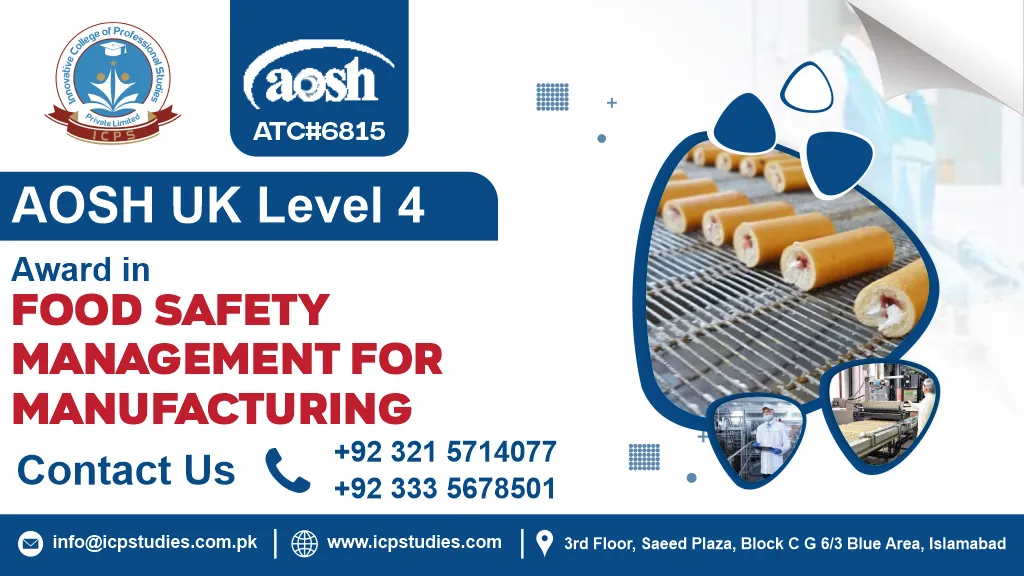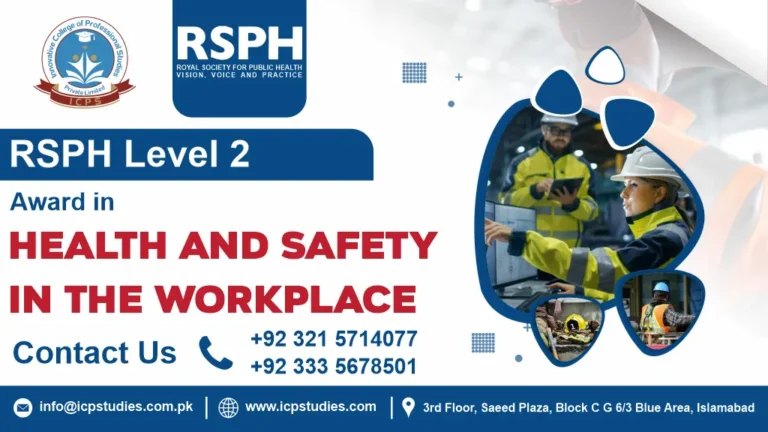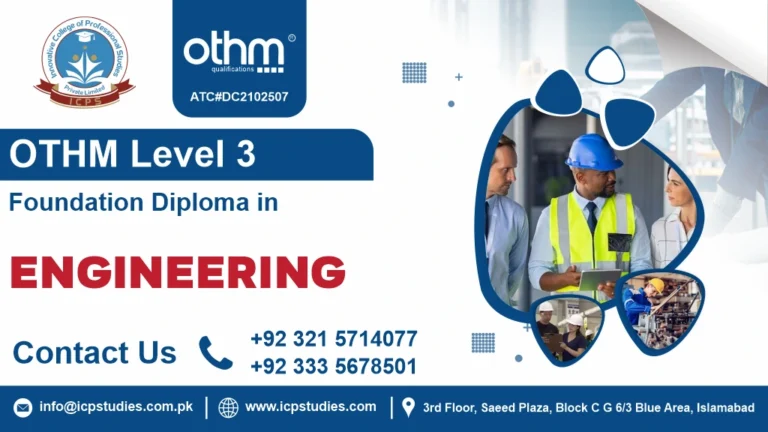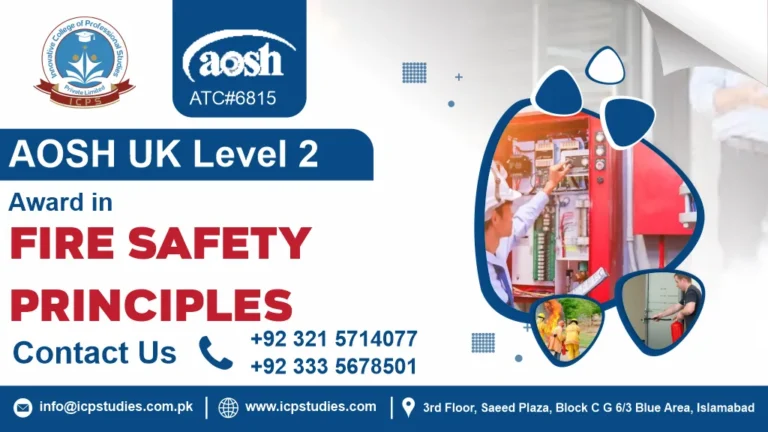Step into a realm where expertise transcends boundaries and innovation fuels excellence—the world of food safety management for manufacturing. The curtain rises, and the stage is yours, beckoning professionals with aspirations to soar to the zenith of their careers. Behold the invitation to excellence as admission unfolds for the esteemed AOSH UK Level 4 Award in Food Safety Management for Manufacturing—an unparalleled program meticulously crafted to refine your proficiency, sculpt industry leaders, and uphold the most exacting standards of safety in the intricate landscape of food production.
Picture a journey that surpasses the ordinary, where every module is a brushstroke on the canvas of your expertise. The AOSH UK Level 4 Award is not just a program; it’s an odyssey designed to elevate, inspire, and empower you to become a stalwart in the dynamic field of food safety management.
This isn’t just a certification; it’s your ticket to a journey of mastery in the art of food safety management. Imagine being at the forefront of industry advancements, leading the charge to establish a manufacturing landscape where safety is not just a priority but an ingrained ethos at every stage of production.
All About AOSH UK Level 4 Award in Food Safety Management for Manufacturing
Course Overview
The AOSH UK Level 4 Award in Food Safety Management for Manufacturing is an advanced and esteemed certification program meticulously crafted to empower professionals within the food manufacturing industry with comprehensive expertise in food safety management. Tailored for individuals aspiring to ascend to the highest levels of their careers and significantly enhance the safety and quality of food production in the manufacturing sector.
This advanced certification transcends the fundamentals, providing an in-depth understanding of intricate concepts. Tailored for those with aspirations for leadership roles, the program furnishes participants with the knowledge and skills essential to navigate the complexities of food safety management in manufacturing. Globally recognized, the Level 4 Award not only unlocks avenues to international career prospects but also stands as a distinguished mark of distinction for professionals committed to advancing safety standards in the multifaceted realm of food manufacturing. It represents a transformative journey propelling individuals to the forefront of their industry, where they assume pivotal roles in shaping the future of food safety.
Learning Outcomes
- Advanced Understanding of Food Safety Principles: Gain a comprehensive and advanced understanding of food safety principles, including hazard analysis, critical control points (HACCP), and risk assessment, enabling participants to navigate complex manufacturing processes effectively.
- Leadership in Food Safety Management: Develop leadership skills specific to food safety management. Participants will be equipped to lead and inspire teams, set industry standards, and drive a culture of excellence in safety within the manufacturing environment.
- Crisis Management Proficiency: Acquire proficiency in crisis management strategies related to food safety. Learn how to effectively respond to and manage crises, ensuring the swift resolution of issues to maintain safety standards in manufacturing.
- Integration of Cutting-Edge Technologies: Explore and integrate cutting-edge technologies relevant to food safety in manufacturing. Understand how technological advancements can enhance safety protocols and contribute to the overall improvement of food safety standards.
- Application of Regulations and Best Practices: Develop the ability to interpret and apply evolving regulations and industry best practices in food safety. Stay abreast of the latest standards to ensure compliance and adherence to the highest safety and quality standards in manufacturing.
- Risk Assessment and Mitigation Skills: Hone skills in risk assessment and mitigation specific to food manufacturing. Participants will be proficient in identifying potential risks, implementing effective mitigation strategies, and creating a proactive approach to risk management.
- Networking and Collaboration: Foster networking and collaboration skills within the industry. Connect with professionals, industry experts, and mentors, facilitating continuous learning, knowledge exchange, and collaboration in the field of food safety management.
- Effective Communication of Safety Protocols: Develop effective communication skills to convey safety protocols clearly and ensure their seamless implementation throughout the manufacturing process. Clear communication is crucial for maintaining safety standards across teams.
- Strategic Thinking and Decision-Making: Cultivate strategic thinking and decision-making skills in the context of food safety management. Participants will learn to make informed decisions that align with safety objectives and contribute to the overall success of manufacturing processes.
- Continuous Professional Development: Instill a mindset of continuous professional development. Participants will be equipped with the tools and resources to stay updated on emerging trends, technologies, and regulations, ensuring ongoing excellence in food safety management.
Admission Criteria
- Educational Qualifications: Prospective participants should typically hold a relevant academic qualification, such as a bachelor’s degree in a related field. While this is not always mandatory, having a foundational educational background enhances the participant’s ability to grasp advanced concepts.
- Professional Experience: A significant requirement is relevant professional experience within the food manufacturing industry. Participants are often expected to have a minimum number of years working in roles related to food safety, quality assurance, or a comparable field within the manufacturing sector.
- Managerial or Leadership Experience: Given the program’s focus on leadership in food safety management, participants are often required to have managerial or leadership experience. This ensures that participants can effectively apply advanced concepts in leadership roles within the manufacturing environment.
- Language Proficiency: As the program involves a significant amount of reading, writing, and communication, participants are typically required to demonstrate proficiency in the language of instruction, usually English. This may be assessed through standardized language proficiency tests.
Ideal Candidate
- Educational Background: An ideal candidate typically holds a relevant academic qualification, such as a bachelor’s degree in food science, food technology, quality management, or a related field. Advanced degrees or additional certifications in food safety may enhance the candidate’s suitability.
- Professional Experience: The candidate should have a substantial background in the food manufacturing industry, with a minimum number of years of experience in roles related to food safety, quality assurance, or a comparable field. Managerial or leadership experience is particularly valued, showcasing the ability to drive safety initiatives.
- Leadership Potential: The ideal candidate exhibits strong leadership potential. They should demonstrate past experiences where they have led teams, implemented safety protocols, and contributed to the overall improvement of safety standards within the manufacturing sector.
- Commitment to Food Safety Excellence: A genuine commitment to excellence in food safety is paramount. The ideal candidate is driven by a passion for ensuring the highest standards of safety in food production, contributing to a culture of continuous improvement and adherence to global best practices.
- Communication Skills: Effective communication skills are crucial. The ideal candidate can articulate complex concepts clearly, ensuring that safety protocols are understood and implemented seamlessly throughout the manufacturing process. This includes the ability to communicate with diverse stakeholders.
- Analytical and Critical Thinking: Strong analytical and critical thinking skills are essential. The candidate should be adept at analyzing complex situations, conducting risk assessments, and making informed decisions that align with safety objectives in the manufacturing environment.
- Continuous Learner: An ideal candidate is committed to continuous learning and professional development. They stay updated on emerging trends, technologies, and regulations within the food manufacturing industry, positioning themselves as proactive contributors to advancements in food safety.
- Problem-Solving Ability: The ability to identify and solve problems related to food safety is a key attribute. The ideal candidate should demonstrate a proactive approach to addressing challenges, mitigating risks, and implementing effective solutions within the manufacturing context.
- Global Perspective: Given the international recognition of the AOSH UK Level 4 Award, an ideal candidate may possess a global perspective. This includes an understanding of international standards, a willingness to collaborate with professionals from diverse backgrounds, and an awareness of global best practices.
- Ethical and Professional Conduct: Ethical conduct and professionalism are non-negotiable. The ideal candidate upholds the highest standards of integrity, demonstrating a commitment to ethical practices in food safety management and maintaining a positive professional reputation.
Key Takeaways
Study Units
- Advanced Food Safety Principles
- In-depth exploration of advanced principles in food safety management.
- Comprehensive understanding of hazard analysis, critical control points (HACCP), and risk assessment specific to food manufacturing.
- Leadership in Food Safety Management
- Developing leadership skills tailored to the field of food safety.
- Strategies for leading teams, setting industry standards, and fostering a culture of excellence in safety within the manufacturing environment.
- Crisis Management in Food Manufacturing
- Proficiency in crisis management strategies related to food safety.
- Effective response to and management of crises to maintain safety standards in manufacturing.
- Integration of Technologies in Food Safety
- Exploration and integration of cutting-edge technologies relevant to food safety in manufacturing.
- Understanding how technology advancements can enhance safety protocols and overall food safety standards.
- Regulatory Compliance and Best Practices
- Interpretation and application of evolving regulations and industry best practices in food safety.
- Ensuring compliance with the latest standards to maintain the highest safety and quality standards in manufacturing.
- Advanced Risk Assessment and Mitigation
- Advanced skills in risk assessment and mitigation specific to food manufacturing.
- Proficiency in identifying potential risks, implementing effective mitigation strategies, and fostering a proactive approach to risk management.
- Effective Communication of Safety Protocols
- Developing effective communication skills to convey safety protocols clearly.
- Ensuring seamless implementation of safety measures throughout the manufacturing process through clear and concise communication.
- Strategic Thinking and Decision-Making in Food Safety
- Cultivation of strategic thinking and decision-making skills in the context of food safety management.
- Informed decision-making that aligns with safety objectives and contributes to the overall success of manufacturing processes.
- Continuous Professional Development in Food Safety
- Instilling a mindset of continuous professional development.
- Equipping participants with tools and resources to stay updated on emerging trends, technologies, and regulations for ongoing excellence in food safety management.
- Case Studies and Practical Application
- Application of theoretical knowledge through real-world case studies.
- Practical insights and simulations to ensure participants can apply advanced concepts effectively in the manufacturing environment.
FAQs for AOSH UK Level 4 Award in Food Safety Management for Manufacturing






